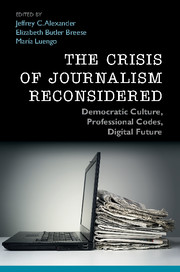Book contents
- Frontmatter
- Dedication
- Contents
- About the Contributors
- Preface
- Acknowledgments
- Introduction: Journalism, democratic culture, and creative reconstruction
- PART I THE CRISIS NARRATIVE
- PART II FEARS OF DIGITAL NEWS MEDIA: THE SYMBOLIC STRUGGLE
- PART III PROFESSIONAL JOURNALISM, CIVIL CODES, AND DIGITAL CULTURE
- 11 Journalism in American regional online news systems
- 12 Digital media and the diversification of professionalism: A US–German comparison of journalism cultures
- 13 Professional and citizen journalism: Tensions and complements
- 14 Expressions of right and wrong: The emergence of a cultural structure of journalism
- Conclusion: News innovations and enduring commitments
- Index
- References
13 - Professional and citizen journalism: Tensions and complements
from PART III - PROFESSIONAL JOURNALISM, CIVIL CODES, AND DIGITAL CULTURE
Published online by Cambridge University Press: 05 June 2016
- Frontmatter
- Dedication
- Contents
- About the Contributors
- Preface
- Acknowledgments
- Introduction: Journalism, democratic culture, and creative reconstruction
- PART I THE CRISIS NARRATIVE
- PART II FEARS OF DIGITAL NEWS MEDIA: THE SYMBOLIC STRUGGLE
- PART III PROFESSIONAL JOURNALISM, CIVIL CODES, AND DIGITAL CULTURE
- 11 Journalism in American regional online news systems
- 12 Digital media and the diversification of professionalism: A US–German comparison of journalism cultures
- 13 Professional and citizen journalism: Tensions and complements
- 14 Expressions of right and wrong: The emergence of a cultural structure of journalism
- Conclusion: News innovations and enduring commitments
- Index
- References
Summary
INTRODUCTION: DEMOCRACY AND JOURNALISM
Democracy remains a normative vision – even if aspects of it continue to be debated – and it is this context of democratic ideals that ultimately accords journalism its raison d’être and legitimacy. The contemporary crisis of journalism must be understood as one important dimension of the serious dilemmas that have been confronting democracy itself. The two sets of problems are inextricably linked, even if each has its unique factors and dynamics. Thus, discussions about journalism's difficulties, and possible resolutions to them, must keep in sight its role in the dynamics of democracy. One particular aspect of this role has to do with how and to what extent journalism helps facilitate citizens’ involvement in the life of democracy. Without minimal degrees of civic engagement, democracy atrophies, and journalism, at least indirectly, is understood as serving a key function here. In recent years, however, we have been seeing a strong increase in a phenomenon that is not covered by theories of democracy or traditional conceptions of journalism: Citizens are engaging in public life via practices that resemble or make claim to be journalism.
Thus, a significant feature of the current turbulence in which journalism finds itself is the growth in what a number of authors call citizen journalism(CJ) (Allen and Thorsen 2009, 2014; Holton, Coddington, and de Zúñiga 2013; Simmons 2014; Wall 2012), sometimes also called participatory journalism (Singer, Hermida, Domingo, et al. 2011; Thurman and Hermida 2010). Citizen journalism has come to constitute both problems and possibilities for professional journalism(PJ), and it is the dynamic between the two that I explore in this chapter. Citizen journalism is a very heterogeneous phenomenon, and the vocabulary for discussing it is not yet fully fixed, as I discuss later. Mainstream journalism itself is hardly all of one piece. For ease of exposition, and in order to highlight contrasts, I will be working with what in essence are two ideal types: professional journalism and citizen journalism. While some nuance and detail will inevitably be lost in such a conceptualization, it is my hope that this approach will help to highlight basic logics at work and to elucidate key contrasts.
My analysis suggests that CJ constitutes neither the demise of good journalism nor its salvation. PJ is confronting CJ, sometimes defiantly, but is also benefitting from adapting to it.
- Type
- Chapter
- Information
- The Crisis of Journalism ReconsideredDemocratic Culture, Professional Codes, Digital Future, pp. 247 - 263Publisher: Cambridge University PressPrint publication year: 2016
References
- 5
- Cited by

